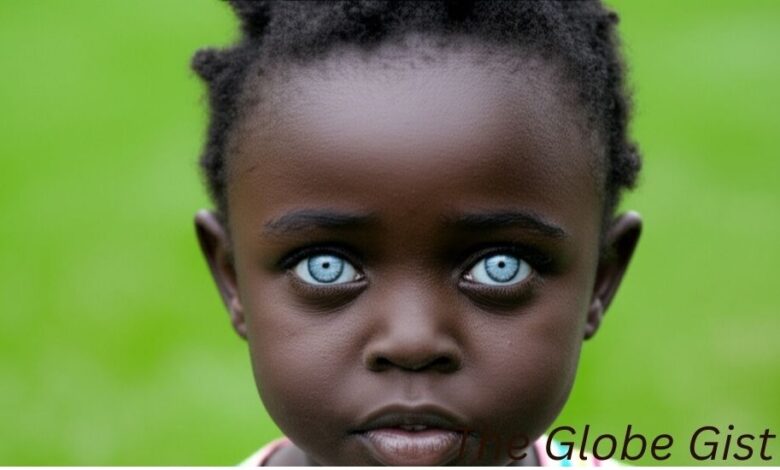Can Black People Have Blue Eyes? A Complete Guide to Genetics, Rarity, and Myths

The question “can Black people have blue eyes?” often sparks curiosity, surprise, and even disbelief. This is because blue eyes are commonly associated with populations of European descent, especially those from Northern and Eastern Europe where the prevalence of blue eyes is highest. However, blue eyes are not exclusive to one race. The truth is that yes, Black people can have blue eyes—though it is rare, influenced by genetics, ancestry, or certain medical conditions.
Understanding how and why blue eyes appear in Black individuals requires exploring the science of eye color, historical context, and the myths that surround this unusual trait.
The Science of Eye Color
Eye color is not determined by a single gene, nor is it a simple “dominant vs. recessive” trait as once thought. Instead, it is polygenic, meaning multiple genes work together to influence how much melanin—the pigment responsible for color—is present in the iris.
-
Brown eyes: High melanin levels, the most common worldwide.
-
Blue eyes: Low melanin in the iris, which scatters light and gives the appearance of blue.
-
Green and hazel eyes: Intermediate levels of melanin, with varying shades.
The two most influential genes in determining eye color are OCA2 and HERC2, located on chromosome 15. A specific mutation in the HERC2 gene reduces the activity of OCA2, leading to lower melanin levels in the iris and producing blue eyes. Importantly, this genetic variant can be inherited by anyone, regardless of ethnicity.
Why Blue Eyes Are Rare in Black People
While blue eyes are possible in Black populations, they are uncommon due to the lower frequency of the HERC2/OCA2 variants outside Europe. Genetic studies show that the mutation linked to blue eyes likely originated thousands of years ago in the Black Sea region, eventually spreading through Europe.
That said, the world is far more interconnected than we often think. Migration, trade, colonization, and intermarriage over centuries mean that genetic traits—including the blue-eye variant—have appeared in populations across Africa, the Americas, and beyond.
Genetic Inheritance and Ancestry
When asking “can Black people have blue eyes?”, one major factor is ancestry. For instance:
-
A Black child with one or more parents carrying the blue-eye allele could inherit it, even if their immediate family members all have brown eyes.
-
Historical mixing of populations during slavery, colonization, or migration may have introduced the allele into African and African diaspora gene pools.
-
Sometimes, the appearance of blue eyes in Black families surprises parents who had no knowledge of European ancestry—but genetics can reappear after many generations.
Medical Conditions That Cause Blue or Light-Colored Eyes
Not all cases of blue eyes are the result of standard genetic inheritance. Certain medical conditions can also result in unusually light or strikingly blue eyes among people of African descent:
-
Waardenburg Syndrome – A genetic condition that can cause pale blue eyes or heterochromia (two different eye colors).
-
Ocular Albinism – Reduced pigmentation in the eyes can result in blue or very light-colored irises, even when skin and hair remain pigmented.
-
Horner’s Syndrome and Other Disorders – Rarely, trauma or health conditions affecting pigmentation may change eye color.
While these are not the majority of cases, they highlight that biology allows for blue eyes in all races, including Black individuals.
Cultural and Social Reactions
When Black people with blue eyes appear in media or real life, they often become the subject of fascination. This can be both positive and negative:
-
Positive curiosity: Admiration for their rare and striking appearance.
-
Negative reactions: Misconceptions that their eye color is “unnatural,” “fake,” or a result of cosmetic contact lenses.
For example, viral stories from Nigeria and the African diaspora have shown children with naturally blue eyes gaining international attention. Some faced discrimination locally but later became symbols of natural diversity and uniqueness.
Famous Examples and Cases
Throughout history and modern times, there have been notable Black individuals with naturally blue eyes:
-
Genetic photography studies have documented African children with light eyes as proof of natural genetic variation.
-
Media coverage of Nigerian, African American, and Caribbean families with blue-eyed members has challenged the stereotype that only Europeans can have them.
These examples help normalize the idea that eye color diversity exists across all populations.
Myths and Misconceptions
Myth 1: Blue eyes are exclusive to white or European people.
Fact: Any ethnicity can carry the gene mutation responsible for blue eyes.
Myth 2: If a Black person has blue eyes, it must come from albinism.
Fact: While albinism can cause blue or grayish eyes, not all blue-eyed Black individuals have albinism.
Myth 3: Blue eyes in Black people are always fake or cosmetic.
Fact: While colored contact lenses are popular, naturally blue eyes do occur in Black populations.
Myth 4: Eye color is a simple dominant/recessive trait.
Fact: Eye color is polygenic and influenced by multiple genes.
The Role of Environment and Health
Interestingly, lighter-colored eyes, including blue, may have some implications for health:
-
Light sensitivity: Blue eyes have less melanin, which can make them more sensitive to bright sunlight.
-
Increased risk of eye conditions: Some studies suggest lighter eyes may have a slightly higher risk of macular degeneration.
However, these risks are minor compared to overall eye health habits, UV protection, and genetics.
Can Black Babies Have Blue Eyes?
Yes, some Black babies are born with blue or gray eyes. However, infant eye color often changes within the first year of life. This is because melanin production in the iris continues after birth, sometimes darkening the eyes to brown or hazel over time. Still, in cases where the genetic variant is present, the eyes may remain blue into adulthood.
Why This Question Matters
Asking “can Black people have blue eyes?” is not just about biology—it reflects deeper issues of representation, race, and beauty standards. For centuries, traits like blue eyes and blonde hair have been celebrated in Western media as ideals of beauty, often sidelining natural features in people of African descent. Recognizing that blue eyes can exist in Black populations disrupts stereotypes and expands our understanding of human diversity.
Final Thoughts
So, can Black people have blue eyes? Absolutely—though it is rare. Blue eyes among Black individuals are most often explained by genetics, ancestry, or in some cases, medical conditions. While uncommon, they are a natural variation that highlights the richness of human diversity.
It is important to move beyond myths and stereotypes, and instead appreciate that beauty and uniqueness exist in every community. The next time someone asks this question, the answer should be clear: genetics does not limit eye color to one race.
In closing, this article is part of a broader mission to highlight fascinating truths about human diversity and genetics. For more insightful content on unique topics like this, you can always explore The Globe Gist.
Q1: Can Black people naturally have blue eyes?
A1: Yes, Black people can naturally have blue eyes. Though rare, it occurs due to genetic variation, ancestry, or conditions that affect pigmentation.
Q2: Do blue eyes in Black people always come from European ancestry?
A2: Not always. While European ancestry is one pathway, blue eyes can also appear due to rare genetic mutations or syndromes like Waardenburg syndrome, without direct European influence.
Q3: Can Black babies be born with blue eyes?
A3: Yes, some Black babies are born with blue or gray eyes. Their eye color often changes to brown or hazel as melanin develops, but in some cases, the blue color remains for life.
Q4: Are blue eyes in Black people caused by albinism?
A4: Not exclusively. While ocular albinism can cause blue eyes, many blue-eyed Black individuals have typical pigmentation and inherit the trait genetically.
Q5: How rare are blue eyes in Black populations?
A5: Extremely rare. Globally, about 8–10% of people have blue eyes, but the percentage among Black populations is far smaller, making it a unique feature.
Q6: Can eye color change over time?
A6: Yes. Many babies start with lighter-colored eyes, which may darken during the first year as melanin production increases. However, if the blue-eye gene is present, the color may stay blue.
Q7: Do blue eyes affect vision or health?
A7: Blue eyes are not harmful, but because they contain less melanin, they can be more sensitive to sunlight and glare. Protecting the eyes with sunglasses is helpful.
Q8: What genes are responsible for blue eyes?
A8: The main genes are OCA2 and HERC2 on chromosome 15. A mutation in HERC2 reduces OCA2 activity, lowering melanin in the iris and producing blue eyes.
Q9: Is it true that blue eyes only came from one ancestor?
A9: Genetic studies suggest the common blue-eye mutation may have originated thousands of years ago in the Black Sea region, but it spread globally and is not limited to Europeans today.
Q10: Are there famous cases of Black people with blue eyes?
A10: Yes. Stories of Nigerian children with naturally blue eyes, as well as individuals in the African diaspora, have gained media attention, challenging stereotypes about eye color.
Q11: Why do people doubt when a Black person has blue eyes?
A11: Because blue eyes are uncommon in Black populations, some assume they must be cosmetic or unnatural. In reality, they can be completely natural and genetic.
Q12: What do blue eyes in Black people symbolize culturally?
A12: In some communities, they may be seen as rare beauty, while in others, they may provoke discrimination or disbelief. Today, they are increasingly recognized as part of natural human diversity.
Thanks for read our article if you want more like this kind of article visit our site The Globe Gist, and comment us.



